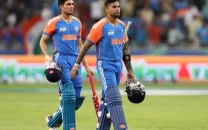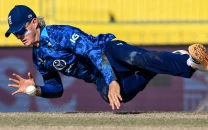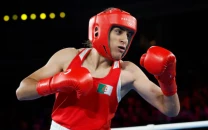Still missing Miandad
As we cheered on great, green glory of Pakistani cricket on Sunday, there was en masse recognition of one man’s legacy

The writer is a lawyer based in Lahore and studied law at Lincoln’s Inn and the London School of Economics. He tweets @AsadRahim
For once, and it really is just this once, the stats are too good to pass up. India had slammed a big 245 in Sharjah, and it was 245 runs that it piled on again in Dhaka. The margin of victory in ‘86 was the closest for any Indo-Pak battle royale. Last Sunday’s was the second-closest.
That still doesn’t cover the cleanest comparison: the visual of Shahid Afridi clobbering R Ashwin with two sixes off the last over, Pakistan’s Miandad Moment 2.0.
Said Misbah of Afridi, “He won us a game that almost went out of our control.” It’s usually Afridi that goes out of control, and well before the game. This Asia Cup’s Pakistan versus India match wasn’t one of them.
Having gone rogue against Afghanistan, Afridi repented, “If I have 15 to 25 overs to bat, the captain tells me to play singles and doubles. I become double-minded. It’s not in my nature.” Boom Boom’s nature, then, is to play Whack-A-Mole in short bursts. And he did just that in Dhaka, proving again and again that Shahid Afridi remains the most electrifying man in cricket. When he feels like it.
R Ashwin, meanwhile, may have to fend off Friend Requests from Chetan Sharma, who turned 48 in January. Twenty-five years to the day Miandad belted his ball for a six, Mr Sharma still makes it sound like war trauma, “Yes it haunts me even now and will haunt me for the rest of my life … I try to forget that last ball, but people don’t let me.”
And the same people brought up the same Javed Miandad all of Sunday. No doubt, this was Lala’s victory, and Misbah’s (and yes, Hafeez’s too), but it was also testament to the right-hand smash-mouth from Karachi, and what Rahul Bhattacharya called, “the single most famous stroke in Pakistan’s history, perhaps even India’s history”.
It took greatness — in the form of Abdul Hafeez Kardar — to spot greatness, dubbing the then-unknown Javed “the find of the decade”. Miandad was barely 18. What followed is well known.
The debut century. The double century. The West Indies in ‘84. World Cup glory in ’92. The sadistic, career-long thrashing of New Zealand. And a whopping 8,832 Test runs on the way (Inzi came within a hair’s distance, at 8,829).
But none of that made him Miandad. Talent made him famous. Anger made him special.
Because Javed Miandad — a 5’8” discipline case with the voice of a ballet teacher — put steel in our spines. Like a general concussed senseless, he charged armies much larger, swore at bowlers much bigger, and cared nothing for teams, well, much whiter. “He was one of the first blokes from the subcontinent who wouldn’t take a backward step when Australian players were aggressive,” mused Greg Chappell.
When it came to sledging — i.e., cowing the opposition — it was the Australians that set the rules. Then Miandad happened.
His Urdu was no bar. Rodney Hogg didn’t understand a word, but knew it was “really unpleasant stuff”. Fielding against Ian Chappell, Asif Iqbal remembered Miandad “kept up a barrage of talk in Urdu with the name Ian Chappell figuring prominently. And although none of it was abusive, Ian, unable to understand any of it, probably thought it was. He gradually reached the end of his tether and ended up holing out to deep midwicket.”
Even when Miandad responded to Kiran More’s sledging with brutal mimicry (three massive monkey jumps), neither was penalised. “One of the big problems with the whole incident was that no one spoke in English,” recalled an umpire.
But it took the hubris of Dennis Lillee — in his hometown of Perth — to perhaps, best capture the man. He batted Lillee for a single, but collided with the fast-bowler running. Eventually, Dennis went for a wanton kick to Miandad’s pads; Miandad raged with bat-turned-baton, as if to knock Lillee’s head right off.
As his memoirs show, Miandad was an athlete of rare self-awareness: “I don’t think Dennis or any Australians had expected to see a Pakistani player like me who simply refused to back down … We were after all only from Pakistan and he felt he could take liberties with us.” The advent of Javed Miandad changed all that.
Like the rest of him, his captaincy was colourful. His relationship with Imran Khan too — tormented to the end — was readymade sportswriter fodder: the patrician and the prizefighter, Keble and Karachi, hatred in Hyderabad (Javed was declared at 280). A whole chapter of Miandad’s book is titled Imran and I… and there aren’t that many chapters.
But then, sometimes, he made things personal anyway. As the wonderful Mukul Kesavan wrote in Men In White, his book on the game, “The moment he swashbuckled his way to the crease and took guard, the pitch became an akhara and the match became a scrap. When India played Pakistan and Miandad hit a four, I took it personally. When he hit the six in Sharjah off the last ball of the match (when a four would have done), it was as if he had personally stuck two fingers up every Indian nose.”
Before a sleepy Inzamam nearly walloped Sreesanth, there was Miandad. Before Afridi was blowing violent kisses at Kallis, there was Miandad. Before Umar Akmal was rubbing on jade lipstick like a metro alpha-warrior, there was — well, let’s leave that to Umar Akmal blazing his own trail.
It was never in contention that Javed Miandad was a batsman of extraordinary gifts. But as we cheered on the great, green glory of Pakistani cricket on Sunday, there was en masse recognition of one man’s legacy.
Because without the romance of Sharjah, victory in Dhaka would be nowhere near as sweet.
Published in The Express Tribune, March 4th, 2014.
Like Opinion & Editorial on Facebook, follow @ETOpEd on Twitter to receive all updates on all our daily pieces.



















COMMENTS
Comments are moderated and generally will be posted if they are on-topic and not abusive.
For more information, please see our Comments FAQ